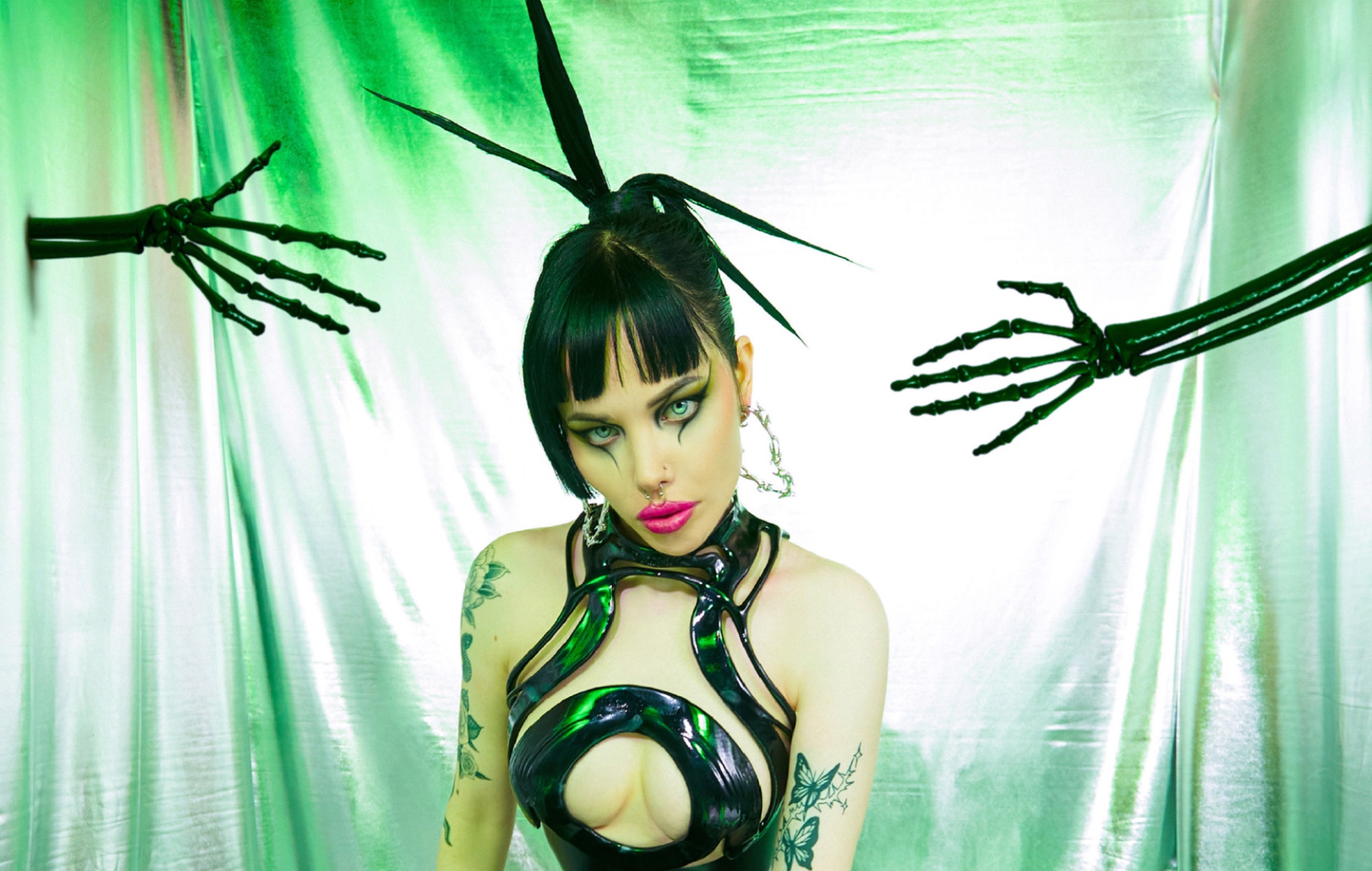
PUP are a band that put humour and surrealism at the forefront of their music. Over shouty, righteous and deeply fun punk rock, the band mix vital conversations on mental health and therapy with self-deprecating one-liners. A taster from recent single ‘Waiting’: “200 bucks a week to talk about my lack of direction? I’ve got a bit of a complex, in case that wasn’t clear from the last three sessions”.
This marriage of serious and fun is a mix that defines the Toronto four-piece’s music, and is pushed to the forefront on recent fourth album, ‘The Unraveling Of PUPTheBand’, which sees the hooks get bigger, the ambition go through the roof and the jokes get even more cutting.
Anchored by a three-track suite called ‘Four Chords’, named after the level of piano frontman Stefan Babcock was able to play at the time (“I can play six chords now!” he tells NME delightedly today), the album plays with business jargon and corporate culture in a way that, somehow, doesn’t feel dull. “So you’re selling insurance? That’s so inspiring / Give me two more years, let me know if you’re hiring,” Babcock spits on closing track ‘PUPTHEBAND Inc. Is Filing for Bankruptcy’, never too quick to turn the joke on himself.
As the band play their first UK shows in three years, NME joins Stefan and drummer Zack Mykula for our latest In Conversation video at London’s Courtyard Theatre to discuss returning to playing live, how the five weeks they spent living and recording in a Connecticut mansion can be reflected in the new album’s musical journey and why Stefan is so attached to one of his guitars. Here’s what we learned.
Returning to playing live shows was a “mindfuck”
When PUP speak to NME, they’ve just played their first show on foreign soil in three years. Just a few months prior, they returned to touring North America after an extended break, the experience of playing live again being somewhat of a “mindfuck”.
“We had to build ourselves up just to get back to playing shows in North America,” Stefan remembers. “That was a mindfuck. Once you start going, it’s like no time has passed, and you just fall back into terrible old habits!”
The band’s first gig back after the pandemic was a hometown show at legendary Toronto club El Mocambo in late March, and Zack remembers the nerves and adrenaline of being back on stage. “It was really fun. There was a lot of people in a packed room, and coming back to it in that way was special.”
“I think it was the first time I was nervous in eight years of playing shows,” Stefan remembers, with Zack adding that he played the songs “way too fast” due to the adrenaline coursing through him.
Stefan wrote ‘Matilda’ about his beloved guitar
‘Matilda’, one of the new album’s singles, was written about Stefan from the perspective of his old guitar “Matilda”, which has been slowly phased out of the band’s live and recorded output, much to her disgust. As Matilda sings (via Babcock): “George and his lover they gently weep / But I don’t even get to breathe.”
“I still play her every night, one or two songs. That’s the maximum my bandmates will allow,” he says. So, how did they meet?
“On our first American tour, we were on tour with a band called The Menzingers, and it was a pretty long tour, and we were pretty broke. I only had one guitar and it got broken at a show and I didn’t have any money to buy a new one. A friend of mine just gave me this guitar and he just went: you need this guitar more than I do! So he gave it to me and his only rule was that I never sell it and that her name’s Matilda and you can’t change it.
Babcock calls it an “incredible act of generosity” for his friend to gift him the guitar, which has now stayed with him for nearly a decade and been played at hundreds of PUP gigs. “I’m pretty attached to it even though according to my bandmates it sounds like shit,” he grins.
Though they once wrote a song about wanting to kill each other, this time it was more harmonious
Perhaps PUP’s most notorious song is 2016’s ‘If This Tour Doesn’t Kill You, I Will’, written – with tongue only slightly in cheek – about getting so fed up with each other on the road that, in the words of Babcock, “Everything you do makes me wanna vomit / And if this tour doesn’t kill you, buddy, I’m on it!”
It seemed quite a gamble, then, when the band decided to decamp to Peter Katis’ residential studio/mansion in Connecticut for five weeks to record ‘The Unraveling’. “We were trying to carve a slightly different path,” Mykula tells NME of the decision to work with Katis, whose credits include The National, Interpol and Frightened Rabbit.
“We were living there and recording. It was kind of like a 24/7 job, which is very different than our normal [process] of recording in Toronto from 10-8 or something,” Stefan says. “If you have an idea at midnight, you go and record it. I’m an early riser, so if I had an idea at six in the morning, I would go and do it. There was a lot more opportunity to work and try different things and not worry if whatever we’re trying to do sucks.”
Over the five weeks with Katis, the band say they went deep down the rabbit hole of recording and residential living, with Stefan explaining there’s a “progression” between the songs recorded at the start and the end of the process. “There’s definitely some weird choices on the album, and if they’re confusing it happened after us being cooped up together after five weeks.”
The album was originally set to be called ‘World’s Greatest Webstore’
‘The Unraveling Of PUPTheBand’ opens with the song ‘Four Chords’, a piano-based track written by Stefan that skewers the business side of the music industry. He sings: “Quarterly meetings, the board of directors / We try and determine how best to proceed. I said, I play piano, I start learning last Thursday I spent every cent of the label money on this thing.”
By the album’s last song, as its title reveals, ‘PUPTHEBAND Inc. Is Filing for Bankruptcy’, as Stefan spirals towards crisis (“Thanks for having us, it’s an honour / And I just wanna thank all the sponsors”).
While all said with tongue in cheek, the business of the band has come into sharp focus over the pandemic, with Stefan joking that they stopped becoming a band and turned into the “world’s greatest webstore,” a once-mooted title for album four.
“We have a lot of people that we love and respect around us, and that we trust, so when somebody says, ‘That’s stupid, even for you guys’, then we know like, ‘Okay’,” Stefan laughs, with Zack adding: “Sometimes you’ve got to farm it out to someone outside the band to really check, and kick the wheels on the most idiotic idea possible.”
Every song they have written with success in mind has “failed miserably”
The corporate side of being in a band – even one that emerged from a DIY punk scene like PUP – is an increasing focus as they try to provide for the band, crew and families. While able to poke fun at the ideas within their songs, the battle between creative freedom and economic productivity is one they’ve wrestled with a lot. As they tell NME though, every time they’ve tried to write a song in order to be a success, it’s fallen on its face.
“It’s always kind of been on our mind,” Stefan says of the meeting between business and creativity in PUP. “It’s not a new concept, the meeting of art and commerce, but it’s always on our mind because we have to try so hard to separate the music that we want to make from the business goals that we have. When the two start to infiltrate each other, it just causes problems. Every song we’ve ever tried to write with the business in mind has failed miserably and caused a lot of problems within the band. It’s always a struggle to keep those two separate, but definitely as things become more and more successful, they start to rub against each other.”
‘The Unraveling Of PUPTheBand’ is out now via Little Dipper/Rise.
The post Five things we learned from our In Conversation video chat with PUP appeared first on NME.








